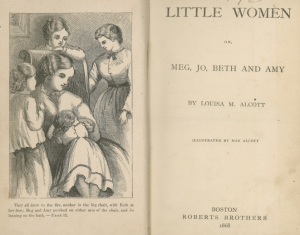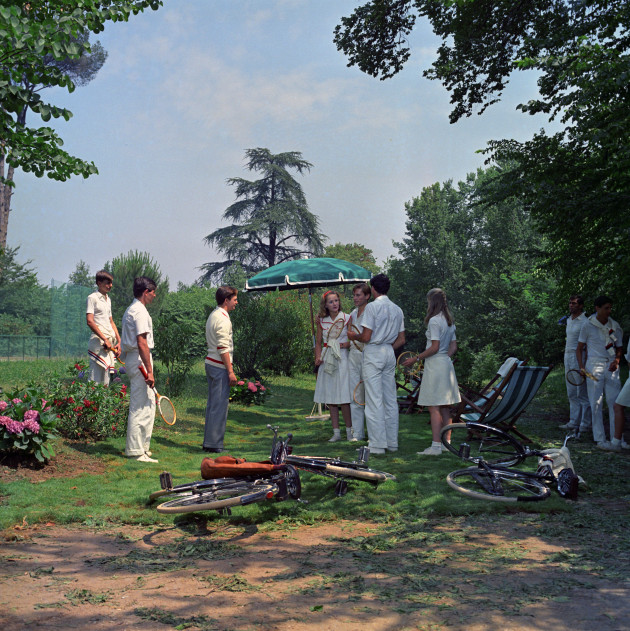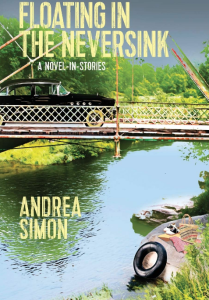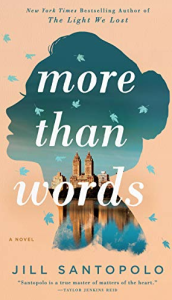The Lilith Blog
January 27, 2020 by Liat Katz
How Family Separation in the Holocaust Affected My Life Forever
I am up watching the news on my phone, and I am fixated on the pictures of small children alone with tinfoil blankets in our own country’s detention centers. Caged like animals, they look alone. Huddled. Despondent.
The feeling in the pit of my stomach from seeing these beautiful children on the news hits me because I feel like I know. I don’t know what it feels to be torn from your parents at a young age, but I know what it feels like to be a child of someone torn from their parents at a young age. Because of my experience with my father who was on the kindertransport in the Holocaust, I not only feel for these children, but feel for their children and generations to come that will feel the burden of this horror.
- 2 Comments
January 22, 2020 by Sarah M. Seltzer
I Thought I Was Jo: Revisiting “Little Women.”
 I thought I was Jo.
I thought I was Jo.
Most people thought they were Jo, it’s true, but I really did, as I inhaled Louisa May Alcott’s Little Women. I tucked it in between the pages of my siddur on Yom Kippur, standing and sitting as instructed by the rabbi, but frolicking in Concord Massachusetts all the while. I was so much like her: mad about injustice, messy, impulsive, bookish, bossy on the playground as I dictated to my friends what we would be pretending that day.
Greta Gerwig’s new, much-ballyhooed film adaptation of Little Women emphasizes Jo’s journey from director of childhood theatricals and imaginary games to successful novelist. Yet it’s not a simple triumph. Jo loses her sister, the possibility of romance torpedoes her closest friendship; her other sisters face their own cares, and her writing life is often more mercenary than glamorous. The film draws out a particular current of bittersweetness from the book, rueing the onset of adulthood; for women, who face pigeonholing (but really for all children, even Laurie, a young man who wants to be part of the play-acting of his girl neighbors) the bigger story is of the gradual winnowing down of childhood’s wild potential.
- 3 Comments
January 21, 2020 by admin
Roe Still Stands — But Not for Everyone
June 27, 2018 began like an ordinary workday. A recent college graduate, I was spending the summer interning at NARAL Pro-Choice Texas, doing grant research.
I was sitting around a table with the staff pitching my initial findings when our phones buzzed. A breaking news alert: Supreme Court Justice Anthony Kennedy had announced his retirement.
The calls from concerned Texans started pouring in immediately. Kennedy was a decisive swing vote on abortion and other issues of reproductive health. What would his retirement mean for the future of reproductive rights?
- No Comments
January 16, 2020 by Amy Stone
Return to the Garden of the Finzi-Continis
 2020 marks the 50th anniversary of Vittorio De Sica’s The Garden of the Finzi-Continis. It’s the tale of an elite Jewish family sequestered behind the walls of their Ferrara estate, ignoring the cascade of Jewish restrictions in Mussolini’s Italy until too late. Back in 1972, the film changed my life.Now I’m reliving it just in time for anniversary screenings at the New York Jewish Film Festival (Jan. 26 and 27): partnership of the Jewish Museum and Film at Lincoln Center, now through Jan. 28.
2020 marks the 50th anniversary of Vittorio De Sica’s The Garden of the Finzi-Continis. It’s the tale of an elite Jewish family sequestered behind the walls of their Ferrara estate, ignoring the cascade of Jewish restrictions in Mussolini’s Italy until too late. Back in 1972, the film changed my life.Now I’m reliving it just in time for anniversary screenings at the New York Jewish Film Festival (Jan. 26 and 27): partnership of the Jewish Museum and Film at Lincoln Center, now through Jan. 28.
When I saw the film with my parents at the New Rochelle art film theater on Main Street, I identified with the protagonists, the aristocratic Finzi-Continis, at play on their tennis court, in their gated garden. When they, too, get deported along with the poorer Jews, I thought, “if I’m ever going to be taken away for being Jewish, I want to know what Jewish is.” So I moved to Israel. And it changed my life.
- No Comments
January 15, 2020 by admin
Laughter As Medicine for Resistance
I had my first real MS flare following the 2016 election, 10 years after my diagnosis. Once I had recovered, I realized that I would need a way to cope with a changed landscape: the news, the politics, the tension.
And for me, they only way to manage the scary reality of a Trump presidency was through comedy. The importance of living in a country that could jeer at the President without being offed or poisoned—mixed with the sheer release of laughing—provided a certain catharsis needed to process a way forward. I also appreciated the importance of comedians tearing apart the Trump Administration’s lies, policies and hypocrisy and making a huge mockery of the people in power.
I knew this particular President was watching—and it would irk him.
- No Comments
January 14, 2020 by admin
Edith Halpert: A Pioneering Dealer and Promoter of American Art
The Jewish Museum’s current major exhibition, “Edith Halpert and the Rise of American Art,” has brought renewed interest to the Downtown Gallery and Halpert herself, a remarkable woman whose department store marketing methodology and relentless promotion of contemporary American art and folk art expanded the artistic landscape throughout the United States. Born Edith Gregoryevna Fivoosiovitch in Odessa, Edith immigrated in 1906, arriving in New York City at age 6.
- No Comments
January 14, 2020 by Mikhal Weiner
Rabbi Susan Silverman on Adoption, Jewish Leadership and That Famous Bat Mitzvah
Last month I had the pleasure of sitting down with Rabbi Susan Silverman to speak about adoption, foster care, Jewish leadership—and of course, officiating Tiffany Haddish’s Bat Mitzvah. The interview has been edited for length and clarity.
MKW: Let’s start at the beginning. What drew you to work as a Rabbi?
SS: I was raised completely secular. The only Jewish thing my family did was on Rosh HaShanah, we would climb a local mountain and when we’d get to the top our dad would say “if there’s a God we’re closer to him up here than those schmucks are down in Temple.” Once in a while my mom would pull out these candlesticks that were her mother’s that her grandmother brought from Poland and we would light them—my mom knew the prayer. So I really had no Jewish education, but I was raised in a very progressive family.
- 1 Comment
January 13, 2020 by admin
Feminist Farming: Learning Teshuvah from the Earth
 We dig a trough for garlic, bury the seed, and I invite the volunteers working alongside me to bless the garden bed. We often bless our work with a simple prayer that the people who eat this food are nourished by it, and that through our hands we can help heal the land we are on. I say a Shehechiyanu under my breath every time someone new joins me in this.
We dig a trough for garlic, bury the seed, and I invite the volunteers working alongside me to bless the garden bed. We often bless our work with a simple prayer that the people who eat this food are nourished by it, and that through our hands we can help heal the land we are on. I say a Shehechiyanu under my breath every time someone new joins me in this.
I farm on twice-stolen land in the Central District of Seattle, Washington, unceded Coast Salish territory. I am a white Jewish woman, and I farm with a white-led nonprofit. And often well-meaning white workers from Amazon and Microsoft come to the small parking-strip-turned-garden-beds that we call a farm, and it is my role to slow everyone down to the pace of the plants, and to be like the plants: to listen, to get to know a place by being shaped by its soil.
At the beginning of each set of community gardening hours, I tell the parts of the story of the Central District that I know. About how Black and Jewish people were redlined to this area. About how the Jews left in their own white flight. About how developers are eating up the land like they won’t ever get enough. I ask volunteers to be sensitive to the fact that people’s lives have been turned upside down, to walk with humility. I explain that we are doing our gardening inside of a wound, and if they can’t fully understand, that’s okay, but to respect that there’s a painful process going on. And that to the people who live here, some of us white folks, whether we like it or not, are the faces and bodies of that process.
- No Comments
January 11, 2020 by Yona Zeldis McDonough
Otherness and Family Secrets—Stories from the Borscht Belt
 Floating in the Neversink (Black Rose Writing), a wistful novel-in-stories, evokes a particular moment in American Jewish culture–the Catskills and New York in the 1950s and 60s. Author Andrea Simon talks to Fiction Editor Yona Zeldis McDonough about her journey back to the past.
Floating in the Neversink (Black Rose Writing), a wistful novel-in-stories, evokes a particular moment in American Jewish culture–the Catskills and New York in the 1950s and 60s. Author Andrea Simon talks to Fiction Editor Yona Zeldis McDonough about her journey back to the past.
YZM: This is a coming-of-age novel in which Mandy’s family is front and center.
AS: The 1950s and 1960s were a unique time in New York for many Jewish families, before they dispersed to faraway areas for settling and travel. In many cases, families provided the pivotal gathering framework for socialization. This was particularly true for New York’s Catskill Mountains, also known as the Borscht Belt.
- No Comments
January 9, 2020 by Yona Zeldis McDonough
After She Lost Her Father, She Found Him
 In More Than Words (Putnam), Jill Santopolo’s newest novel, Nina Gregory faces a double loss—the death of her beloved father and the shattering of her illusions when she discovers that he wasn’t at all the man she thought he was. Santopolo talks with Fiction Editor Yona Zeldis McDonough about what she and her protagonist share—and what they don’t.
In More Than Words (Putnam), Jill Santopolo’s newest novel, Nina Gregory faces a double loss—the death of her beloved father and the shattering of her illusions when she discovers that he wasn’t at all the man she thought he was. Santopolo talks with Fiction Editor Yona Zeldis McDonough about what she and her protagonist share—and what they don’t.
YZM: Your mother is Jewish and your father was Christian; how did that shape your characters?
JS: In my novel, More Than Words, two of the main characters have parents from different places with differing traditions. Nina’s mother’s family is from Greece and her father’s family is from Wales, and Rafael’s mother’s family is from Ireland and his father’s family is from Cuba. Nina and Rafael connect, at one point in the book, when they talk about what it means to feel that duality of identity. That experience, of dual identity, is something that I felt growing up–and still feel today–and the conversation they have was inspired by one that I had with my husband, whose background is the same as mine but reversed. Even though I’ve written many other books, this is the first time that I wrote about that experience, and even though Nina and Rafael’s dual identities don’t match my own, the essence of what it feels like to have a family that’s not simply one thing or another is the same.
- No Comments
 Please wait...
Please wait...